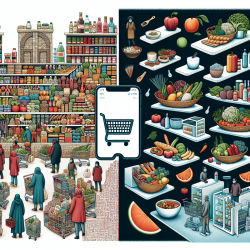The COVID-19 pandemic has significantly altered the landscape of healthy food retail in the United States. As practitioners in the field, understanding these changes is crucial for adapting practices and improving service delivery. The research article "Healthy Food Retail during the COVID-19 Pandemic: Challenges and Future Directions" provides valuable insights into these transformations.
Key Areas of Impact
The research identifies four key areas where the pandemic has impacted the retail food environment (RFE):
- Policy Changes: At various government levels, policies were adapted to address food distribution and consumer behavior. This included new guidelines from agencies like the CDC and USDA to ensure safe operations and support for nutrition assistance programs.
- Retail Actors and Business Models: Businesses had to pivot quickly to survive. Many embraced online sales, delivery services, and alternative business models like mobile markets or community-supported agriculture.
- Customer Experiences: Consumer shopping behaviors shifted dramatically. There was a surge in online shopping, with many opting for curbside pickup or home delivery. However, these changes also highlighted disparities in access for low-income and rural communities.
- Dietary Intake: The shift in consumer behavior affected dietary patterns, with increased home cooking and a focus on long-term storage foods. This shift had varying impacts across different socioeconomic groups.
Recommendations for Practitioners
The research offers several recommendations for practitioners looking to improve their skills and adapt to these changes:
- Stay Informed: Continuously update your knowledge on policy changes affecting food retail. Engage with resources from government agencies like the USDA and CDC.
- Embrace Technology: Encourage clients to utilize online shopping platforms where possible. Educate them on safe online purchasing practices, especially those using SNAP benefits.
- Focus on Equity: Advocate for policies that address disparities in food access. Support initiatives that provide resources to underserved communities.
- Promote Resilience: Encourage local food systems that can better withstand disruptions. Support small businesses and community-based food networks that offer sustainable solutions.
The Path Forward
The pandemic has underscored the need for a more resilient and equitable food system. Practitioners have a crucial role in shaping this future by implementing research-backed strategies and advocating for systemic change. By understanding the impacts of COVID-19 on the RFE, practitioners can better support their communities and contribute to building a healthier society.
If you're interested in delving deeper into this topic, I highly recommend reading the original research paper. To read "Healthy Food Retail during the COVID-19 Pandemic: Challenges and Future Directions," please follow this link.










